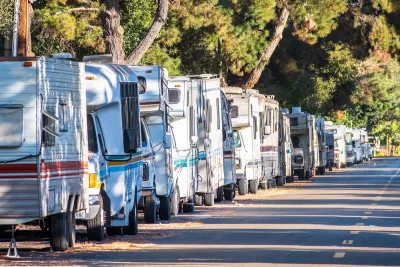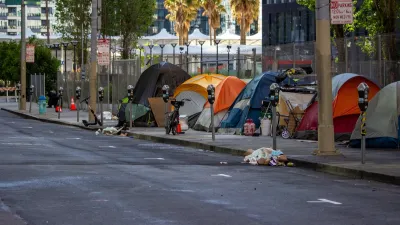A nonprofit leases lots during permitting stages to erect tiny homes and RV safe parking sites for unhoused residents. But the model means constant uncertainty and displacement.

A Seattle parking lot that formerly offered a safe parking space for people experiencing homelessness will lose its lease to a pickleball complex, reports Greg Kim in The Seattle Times.
“In May 2023, the Low Income Housing Institute signed a five-year lease to use an empty lot in Interbay to operate a designated space with services for people living in their vehicles. But the nonprofit said the contract had an early termination option after two years in case the landowner made progress on their development before the end of the lease,” Kim explains.
In most of Seattle, it is illegal to park for more than 72 hours in one spot. The lot provided parking space to 27 RVs and housed 11 tiny homes. It also provided a shared bathroom, laundry, electricity, and RV draining facilities. “People also had access to a behavioral health specialist who offered substance use disorder treatment and mental health counseling.”
The lot provided temporary housing for 87 people since it opened in December 2023. Of those, 30 percent have moved into permanent housing. LIHI commonly uses the permitting period for vacant properties to lease the space for tiny home villages. While the organization describes it as a win-win, it also acknowledges that this system means they often have to relocate residents and find new locations for temporary shelters.
FULL STORY: Seattle’s only homeless RV parking lot makes way for pickleball complex

Maui's Vacation Rental Debate Turns Ugly
Verbal attacks, misinformation campaigns and fistfights plague a high-stakes debate to convert thousands of vacation rentals into long-term housing.

Planetizen Federal Action Tracker
A weekly monitor of how Trump’s orders and actions are impacting planners and planning in America.

In Urban Planning, AI Prompting Could be the New Design Thinking
Creativity has long been key to great urban design. What if we see AI as our new creative partner?

King County Supportive Housing Program Offers Hope for Unhoused Residents
The county is taking a ‘Housing First’ approach that prioritizes getting people into housing, then offering wraparound supportive services.

Researchers Use AI to Get Clearer Picture of US Housing
Analysts are using artificial intelligence to supercharge their research by allowing them to comb through data faster. Though these AI tools can be error prone, they save time and housing researchers are optimistic about the future.

Making Shared Micromobility More Inclusive
Cities and shared mobility system operators can do more to include people with disabilities in planning and operations, per a new report.
Urban Design for Planners 1: Software Tools
This six-course series explores essential urban design concepts using open source software and equips planners with the tools they need to participate fully in the urban design process.
Planning for Universal Design
Learn the tools for implementing Universal Design in planning regulations.
planning NEXT
Appalachian Highlands Housing Partners
Mpact (founded as Rail~Volution)
City of Camden Redevelopment Agency
City of Astoria
City of Portland
City of Laramie





























